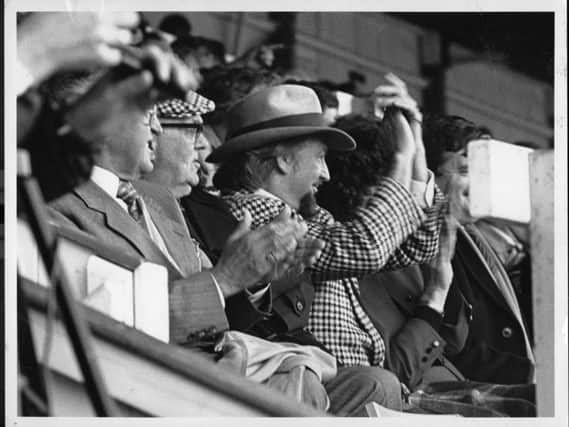Looking back: Raised hopes and harsh realities of early Oyston years at Blackpool FC


On the face of it, the opportunity to cover a club with a millionaire owner was an exciting prospect as I headed for my new job of the coast late in 1988.
In those pre-Sky days, such figures were rare and to an outsider, Blackpool Football Club being run by a man who had made his name – and his fortune – selling property in the resort was a match made in heaven.
Advertisement
Hide AdAdvertisement
Hide AdMoreover, Owen Oyston was a fan, having grown up close to Bloomfield Road and revelled in the skills of the Seasiders greats of the 1950s along with thousands of other townsfolk.
But as I made my bow for The Gazette in the Pool press box, some six months after he had become club owner, it soon became clear that any wind of change prompted by the new regime had yet to manifest itself on the pitch.
The crest of the wave of supporter adulation for then manager Sam Ellis, which had accompanied promotion to the third tier three years earlier, had disappeared and relations appeared strained until Ellis paid the price for a bad run of results a few months later.
Jimmy Mullen, his assistant at the time, stepped into the hot seat and managed to keep Pool up in a nail-biting end to the season before being appointed to the role full-time.
Advertisement
Hide AdAdvertisement
Hide AdOyston was eager to build on that and I recall trips to his palatial home near Lancaster with a photographer to cover the unveiling of signings that summer, such as Gordon Owen and Gary Brook.
But while the owner was happy to fund the fees and wages for such new recruits, it was clear that a sound business platform was a vital balance to any ambitions for on-field success and it was made clear that off-field income from a new stadium was vital to the future of the club.
Plans were drawn up and press conferences held – when new stadia were rare – for a plush new arena to include a floating pitch and retractable roof, and capacity for concerts and other events at Bloomfield Road and at Whyndyke Farm close to the motorway.
None of those plans got beyond the drawing board and finances became tighter after Pool had tumbled back into the bottom tier in 1990, with Mullen sacked half a dozen games from the end of the season.
Advertisement
Hide AdAdvertisement
Hide AdGraham Carr, fresh from doing great things at Northampton Town, seemed an impressive appointment as his full-time successor on paper, but with Pool in the lower reaches of the Fourth Division table, he lasted only until December, when Billy Ayre stepped up from assistant to take his place. What followed was one of the most fondly-remembered spells of the club’s recent past, with Ayre’s management skills earning impressive results galore and clinching promotion via the play-offs in 1992, 12 months after losing on the same Wembley stage.
But the abiding memory of those times is of how well Ayre did with relatively meagre resources he had at his disposal.
It was only after the appointment of Sam Allardyce as next boss - and ex-Northern Ireland manager Billy Bingham to the board and acting as an advisor - that serious investment followed, with the arrival of Andy Preece, Tony Ellis, Andy Morrison and Mickey Mellon, as Oyston appeared to set his stall out to finally see Pool return to the second tier for the first time since 1978.
That objective looked like becoming a reality as Pool enjoyed a great run of form up to the opening months of 1996.
Advertisement
Hide AdAdvertisement
Hide AdBut missing out on automatic promotion was followed, just as my stint on Gazette Sport ended, by play-off misery against Bradford and the sacking of Allardyce.
With Oyston’s time as chairman ended for good by his imprisonment for rape around the same time, it really was the end of an era – but the Oyston ownership went on, with Owen’s wife Vicki initially taking the chair followed by son Karl. In my time as Pool reporter, Owen always made time to speak to The Gazette and was especially keen to do everything he could – such as the timing of press conferences – for the local newspaper to lead the way with coverage of club happenings. The decrepit stadium of the time, long past its sell-by date by then and so fragile that games faced being called off if wind speed rose above 50mph, was clearly a millstone around the club’s neck, and there was clearly more to running a club than finding transfer fees.
But looking back now, who knows what might have been achieved with a little more investment, especially in those Billy Ayre days?